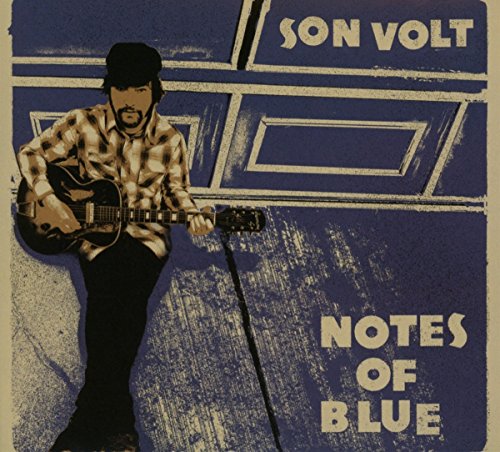
Son Volt
Notes of Blue
Release Date: Feb 17, 2017
Genre(s): Country, Alt-Country, Americana, Pop/Rock, Alternative/Indie Rock, Blues-Rock, Alternative Country-Rock
Record label: Transmit Sound
Music Critic Score
How the Music Critic Score works
Buy Notes of Blue from Amazon
Album Review: Notes of Blue by Son Volt
Very Good, Based on 9 Critics
Based on rating 4/5
Jay Farrar's voice is a unique instrument, one that winds its way around the syllables he writes for his alt-country band Son Volt in ways that are surprising and affecting. Songs about personal heartache and universal angst are right in his wheelhouse, because of the way that he takes simple observations about these topics and reveals new complexities in them by a sudden rise or precipitous tumble in his vocal. Such songs are all over Notes Of Blue, so it's no surprise then about the consistently high quality of the work.
Based on rating 7/10
From the first moment of the achingly beautiful opener "Promise the World" we capitulate, our minds recalling some of the first moments we heard Anodyne from Son Volt precursor Uncle Tupelo. The foil of the pedal steel gleams and folds— a perfect refracting machine for Jay Farrar's chiseled baritone— allowing the onslaught of his could-be confidence-on-paper to bend and break and draw us under. It is there, but only for a portion, on an album that might be much bluer, and might have wiped us out completely.
Based on rating 7/10
That his dustbowl laments are all from the same authorial voice - a kind of post-Guthrie half-Beat, half-blue-collar everyman, constantly pitted against an uncaring world - isn't in question, yet what strikes most clearly and consistently through his work is a harking to the past, a longing for times long gone; musical styles kicked out of fashion; barrooms long burned to the ground. On Notes Of Blue, Farrar dips deep into his well of old-school influence and returns to us with a mixed-up, muted kinda message that concerns itself a little too often with tone and timbre rather than with melody and clarity, sometimes to its detriment. While the Harvest Moon-era Neil Young steel pedal of opener "Promise The World" indeed promises much, we're stuck with pedestrian lyrical observations - "There will be hell to pay / Light after darkness, that is the way" intones Farrar over Jason Kardong's sweet notes.
Based on rating 7/10
Like many of music's celebrated, prolific songwriting talents, there is a restlessness that bubbles at the centre of St. Louis alt-country musician Jay Farrar's creativity. Not content to rest on his laurels as the primary creative force behind genre-defining Son Volt records like Trace and Straightaways, or as co-founder of the now-defunct pioneering alt-country outfit Uncle Tupelo, Farrar and his main creative vehicle (the aforementioned Son Volt_ consistently push creative boundaries by employing new instruments and fresh ideas with each new release.
Based on rating 3.5/5
Since Son Volt's 1995 debut, Trace, Jay Farrar has sometimes had trouble getting out of his own way. But on Notes of Blue, the band's eighth album, he largely sidesteps the very traits—his alternately authoritative and catatonic molasses voice, his resolute adherence to folk traditionalism, his at times clunky, esoteric lyrics—that have both defined and inhibited his work over the last two decades, resulting in some of his most direct, concise, and uptempo music in years. The album is still very much indebted to the folk tradition; as one might surmise from its hackneyed title, the album is heavily influenced by the blues, primarily of the '20s and '30s Delta variety.
Based on rating 3/5
From his earliest days in Uncle Tupelo, when they roughed up No Depression by American folk dynasty The Carter Family, alt.country figurehead Jay Farrar has been more an enthusiastic musical historian than a wannabe star. With Son Volt's eighth album, he cites Mississippi Fred McDowell, Skip James and Nick Drake as pressure points of influence. They can certainly all be heard, in the delicate fingerpicking, mournful slide and Appalachian melodies, but they're touchstones to build on, rather than something to slavishly recreate.
Based on rating 3
The Upshot: You can't help but get the feeling, like many of their other efforts, that the band is recycling some of their music. BY JOHN B. MOORE When Uncle Tupelo officially called it quits and splintered into two bands in the mid- '90s, it become apparent soon after who owned all of the country influences in the Jay Farrar/Jeff Tweedy split. While Tweedy went on a more standard indie rock path with Wilco, Farrar carried on down the alt-country road with his new endeavor Son Volt.
Based on rating 6/10
In the grand tradition of AC/DC, the Ramones, and Robert Pollard, Jay Farrar is a guy who has essentially been making the same record over and over again throughout his career. That's not a bad thing in and of itself; all of those artists have made plenty of great, powerful records that reflected a distinctive style that was theirs and theirs alone. Ever since Uncle Tupelo's March 16-20, 1992, where the divide between Farrar and Jeff Tweedy's writing styles became especially clear, Farrar's music has been dominated by his deep, thoughtful vocals, his strong, elemental melodies, and his bursts of Neil Young-style roughhouse guitar.
Opinion: Excellent
Despite naming its new album Notes of Blue, Son Volt hasn't made a blues album. Or at least not a proper one, and it's probably a stronger record for that. What the band has done is engage with the blues tradition, and turn out their own variation. Jay Farrar has spoken of his particular interest in the guitar tunings of Skip James (often open minor tunings) and Mississippi Fred McDowell (open D).
'Notes of Blue'
is available now

